Permanent Worship
You know the common sack-hauling character, tramping along the gold-dappled wheat as “Gary.” However, we have no actual idea who the Gray Merchant of Asphodel is under that golden mask. But we shall stick with the moniker. Gary is what I would consider an odd but good card. Recently, I’ve heard he’s too slow for Modern, which (sadly) is likely true. Though it is fairly costed for what it does. As a {3BB} for a 2/4, it doesn’t die to Bolts, but it will get eaten by an evoked Fury or Solitude. The upside here is that Gary has to hit the battlefield, do two damage to your opponent, and gain you two life before dying. Is that worth five mana? Depends. If it stays, you get a decent body. If not, what else could you have spent that mana on? What else was on the battlefield with black pips? You likely know it by heart, but let’s look at Gary’s text box.
When Gray Merchant of Asphodel enters the battlefield, each opponent loses X life, where X is your devotion to black. You gain life equal to the life lost this way. (Each {B} in the mana costs of permanents you control counts toward your devotion to black.)
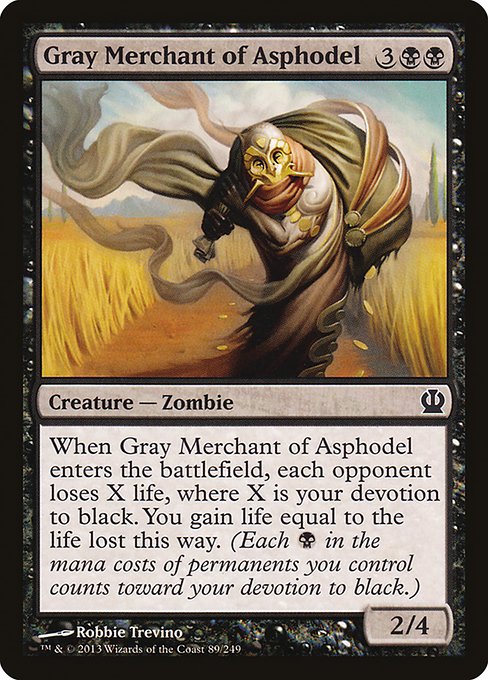
Devotion is a ten-year old mechanic that was introduced in Theros. (It was formerly known as “Chroma” in Eventide, where it counted not just permanents, but all colored mana pips in your possession. Phew.) The mechanic’s name-mutation fits perfectly for Theros, a Greek pantheon-inspired set with avenging gods and plenty of mythic references (e.g. minotaurs, underworlds, gorgons). Worship being what it is, a form of devotion through attention, physical body, money, or speech, Devotion (the mechanic) reflects a keen sense both lore/story and a player’s strategic deckbuilding.
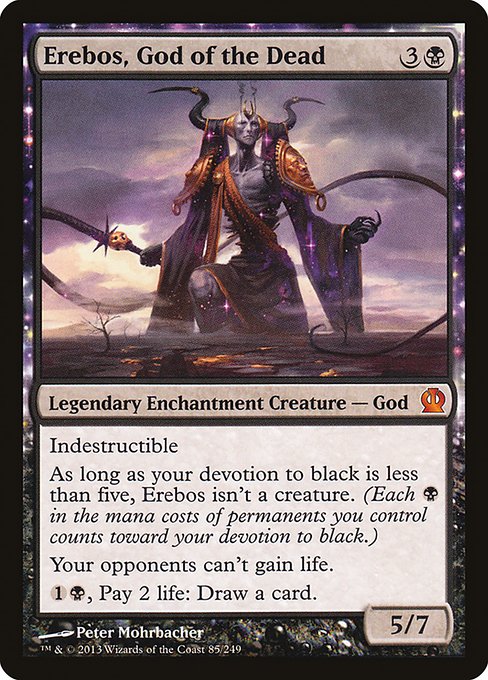
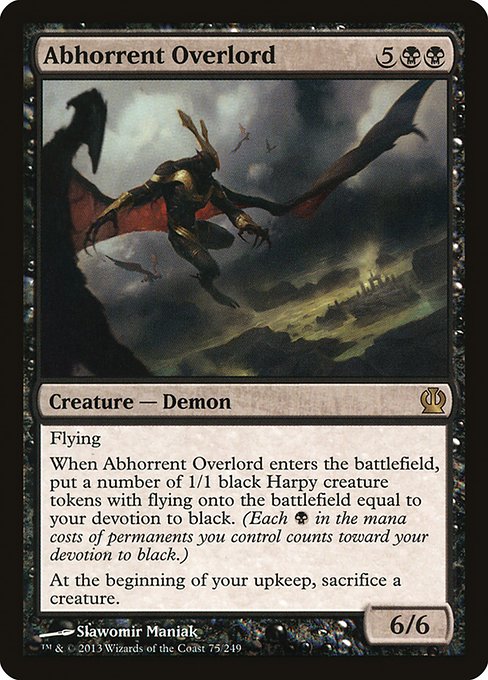
If a player wants to squeeze the most from Gary, then by turn 5 (at the earliest) there could be a few permanents out representing Black. This is like lighting candles in a shrine. And it’s no surprise that Devotion works best in mono-color decks. (A quick look at where Gary is being used is in mono-black devotion decks in Pioneer or in Commander.) The card requires a deep faith in its abilities, from a rhetorical point of view. That is, for the card to do the most justice as it ETBs, it wants you to give your boardstate completely over to Black. If we’re talking Modern, a format with instant speed removal dominating everything, creatures are hard to keep around. So what has to be on the board to give Gary’s devotion a payoff? I want to suggest Enchantments. From a poetic angle, this fits. Enchantments aren’t easy to remove. And etymologically, “chant” is a form of intoning, singing, or reading a sacred text. A form of worship and devotion. Or alternatively, we refer to an enchantment as a charm–a word also with roots in words that mean “sing.” Every permanent will “sing” its devotion to the Merchant and the Merchant will repay by punishing the opponent and bolstering the player.
If we dig a bit deeper into the idea of Devotion (and as a mechanic), and what that word consists of, we find that it comes from Latin words that mean “to formally vow” or “consecrate.” Now, I know that sounds dramatic. I’m just playing a card, Kyle. Yes, I know. But there’s a reason why this card works so well in mono-black builds. Mono-black players are formally vowing to only play one color. At a time in the meta, especially in Modern, where not a lot of mono-color decks are floating around, I feel like a devotion to Black is the ultimate Hurt Opponent/Help You effect. (Gary reminds me of a more recent card, March of Wretched Sorrow, which instead of doing damage to the player, does damage to a creature or planeswalker. March also has the lifegain effect for the amount of damage you do to opponent’s cards; and it asks you to exile cards to help pay for it. Devotion doesn’t get much stronger than that.)
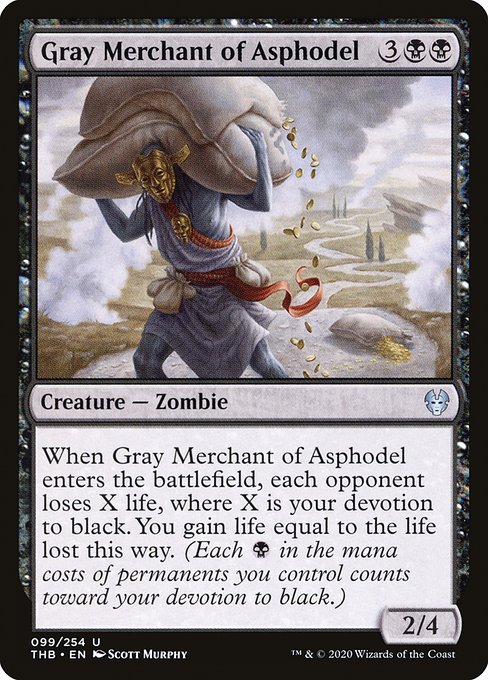
What’s in a (Nick)name?
It’s funny that Magic players are so apt to change the names of (beloved) cards, when so many of them have already rhythmically potent ones. Check it out. The bolded syllables are emphasized.
GRAY | MERCH | ant | of |AS | pho | del
I would consider this dactylic dimeter with an extra syllable in front. What’s even more serendipitous is that dactyls (stressed syllable, unstressed, unstressed) were a staple of Ancient Greek metrical poetry. Plenty of Gary’s whole construction points to the Theros plane. But the one element of the card that I think it most compelling is who the Gray Merchant is inside the lore.
Returned by Fate, a Zombie by Necessity
In the Theros story, Gray Merchant of Asphodel would be considered a Returned, one who has escaped the Underworld and Erebos. The Returned wander in a sort of severed way from their former life since their soul is gone. The body roams the world, but they have little purpose. They don’t remember anything from their lives prior and so are, in a sense, empty. Thus, they fashion gold masks–as we see in the depiction of the merchant in both available art. They are faceless shells that do what they can in the aboveworld. Apparently, Gary has decided to be a merchant–but of what? I would hesitate to say that I know exactly what it is the Merchant sells or buys, but gold coins fall from the bags on his back/shoulders.
What is interesting from a design perspective is that the card’s type is labeled “Zombie,” when in fact it’s explicitly not a zombie in the lore. The following is a scene from early in Journey into Nyx: Godsend Book II by Jenna Helland.
“It’s a Returned,” Daxos said.
“Those are the people who wear gold masks?” Elspeth asked. She’d seen likenesses of them on a frieze in a catacomb below Heliod’s temple.
“A Returned can be anything that escapes the Underworld—anything that had enough consciousness to worship the gods in life.”
“Creatures really come back from the dead?” Elspeth asked in surprise. She’d seen plenty of zombies on other planes, but those mindless creatures hadn’t really come back from the dead. They had been ripped out of the grave by a necromancer. Because Daxos probably had no conception of a “zombie,” she didn’t speak her thoughts aloud.
“No one knows what death is really like in the Underworld,” Daxos said. “The gods tell stories of what it will be like, but only Erebos knows for sure. And he lies. That’s all he does. I’m not sure he knows how not to lie.”
“Do you think your mother might escape?” Elspeth asked. “That she’ll come back to you?”
“I don’t know,” Daxos said. His voice caught in his throat. “I don’t know why some of the dead come back and some don’t. And even when they do come back, they’re not the same. It must be a horrible existence. They have a sense of all they’ve lost, but can’t begin to find it.”
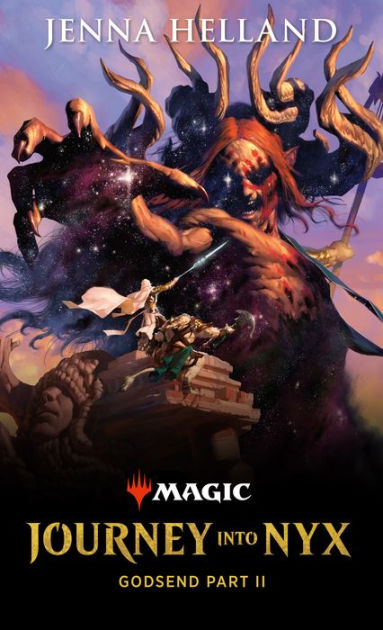
Of course, from a design point of view, why create a whole new creature type called “Returned” when you have “Zombie” sitting right there. Many Returned are viewed as pitiable and forlorn wights that are attracted to past scenes of tragedy. But looking at Gary, one sees a rather hardworking creature, yoking the gold bags over/on top of his shoulders. Maybe he escaped his fate to roam as a mindless avatar of death in life? Or as a driven trader full of guile and deceit?
The asphodel, in our earthly reality–or our human mythology that was created in our world– is the flower of the Greek Underworld–and it is also a necropolis in the Magic lore. A place in the Theros plane referred to as a Despair Land. In real life, the asphodel has gray leaves, a nice mirror-image of the gray skin on the Merchant. So the images for the card don’t necessarily match the name’s meanings…insofar as the merchant is hauling bags of coins instead of flowers. Is he a merchant of Asphodel, the place. Or is he a merchant of asphodels, the flowers? He should be giving the flowers out to the opposition. Both as a sign of deadly welcome and as a happy curse. And woe betide if Gary crosses paths with a Cleaver Skaab…
…Devotion knows no bounds like a copy effect.
Kyle Winkler (he/him) is a teacher and fiction writer. While he was pre-teen when Magic: The Gathering was released, he didn’t start playing until recently. He’s the author of the cosmic horror novella (The Nothing That Is), a collection of short stories (OH PAIN), and a novel (Boris Says the Words). He’s trying to make Obzedat, Ghost Council work as the commander for his most recent deck.

